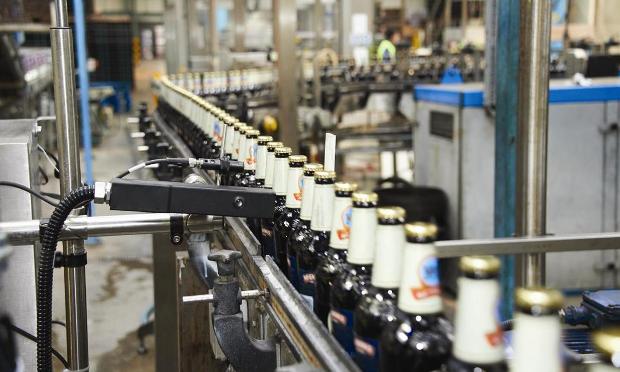
The company behind brands such as Estrella Damm, McEwan’s and Bombardier was on the lookout for new coding kit and opted for equipment from Domino. Tony Corbin discovers how Wells & Young’s saved costs
Who Wells & Young’s
Aim To replace the brewer’s ageing coding and marking equipment
Spend Undisclosed
What A-series continuous inkjet printers
When August 2012
Challenge
Domino is a global producer of printing, coding and marking products to the beverage industry, in addition to food, cosmetics and other sectors. It claims to provide a total solution and says it supplies eight out of 10 of the top beverage producers globally.
In 2012 the UK’s largest private brewery, Wells & Young’s, invested in Domino’s A-series continuous inkjet printers to boost productivity and cut costs. The move followed a sharp rise in maintenance costs for the company’s previous equipment.
The Bedford-based £189m-turnover business, which produces a range of cask beers and speciality lagers, including the Bombardier, McEwan’s, Estrella Damm and Kirin Ichiban brands, turned to Domino after deciding to replace its existing coding and marking machines.
Wells & Young’s small pack continuous improvements leader Justin Adams explains: “Our previous coding and marking printers were early model machines, which we hadn’t upgraded. Due to the age of the machines we had a lot of maintenance problems, downtime was high and we had to have a back up machine for each printer in case any of them developed a fault.”
These difficulties, along with the added expense of service agreements and parts, meant that the cost of operating and maintaining its existing coding and marking equipment rose by 20% in 2011.
“The key challenges for Domino were to replace an incumbent supplier that had a 25-year relationship with the customer,” says Paul Johnson, Domino UK area sales manager. “We also needed to demonstrate how user-friendly our printers are to gain the client’s confidence and trust in Domino and our coding and marking solutions.”
Strategy
After getting the green light to replace the outdated equipment, Adams set about obtaining quotes from different coding and marking suppliers and comparing the different packages.
“I had worked with Domino in previous roles, so it was the first supplier I called to quote for the job as I had always been impressed with the quality and reliability of both its technology and customer care,” he says. “When the proposals came back, the Domino team stood out having really listened to my criteria and for having tailored their recommended solution accordingly.”
One key difference was Domino’s Safeguard five year warranty. This, combined with Domino’s approach to his requirements, immediately impressed Adams.
“Our calculations revealed that, by choosing Domino, our annual running costs, including ink, would be 50% less than if we opted for one of the other suppliers,” he adds.
With Domino (who would also provide operator training) confirmed as supplier, the installation was subsequently “phased to tie in with downtime and maintenance slots on the production lines to minimise disruption,” says Johnson.
Implementation
The brewery installed five new A420i and two new A300+ Opaque continuous inkjet (CIJ) printers in August 2012. Wells & Young’s runs both a high-speed canning and a high-speed bottling line, used to produce up to 30,000 bottles per hour and up to 51,000 cans per hour.
On its bottling lines, the brewery uses the A300+ Opaque printer with Domino’s 253WT white ink to apply twin lines of code onto glass bottles (brown and clear), which range in size from 330ml to 670ml.
The bottles are then placed into a case, via a Kister packaging line, which is then also coded with an A420i printer, using Domino 2BK009 black ink.
On the canning line, the Domino A420i printers are used, with a 6m conduit, to print twin lines of code onto the cans. An OCME tray filler then places the cans onto a tray, with both sides of the tray coded using two of the company’s new A420i machines, while another of the Domino’s new A-series ink jet printers is to be used as a spare in case of any additional requirements.
Results
There is evidence that the company is benefiting from the new equipment as it is set to almost fully recoup its investment after just one year. “Our investment in Domino equipment has saved us significant costs in terms of maintenance, service agreements and machine downtime,” explains Adams. “We’ve been pleased with the sales and service we’ve received from Domino on this project and are now considering further investment in some of their other print and apply label solutions.”





